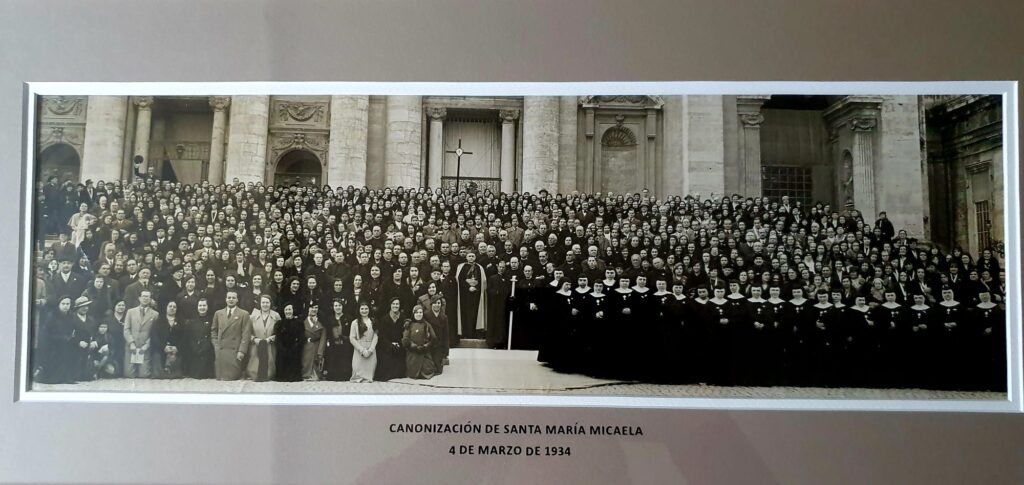This 4th March 2024 marks the 90th anniversary of the canonisation of St. Maria Micaela of the Blessed Sacrament, foundress of our Congregation: Sisters Adorers Handmaids of the Blessed Sacrament and of Charity.
St. Micaela was a courageous and generous woman, who dedicated her life to Eucharistic Adoration and the Liberation of women in prostitution and other situations of violence, the most vulnerable and marginalised of her time. Her work continues today in 24 countries around the world, where Adorers and the entire Adorers Family follow her example, accompanying women in contexts of prostitution, exclusion, violence, trafficking and other situations of vulnerability.
In this article we would like to recall the figure of Saint Maria Micaela through some of the documents that are preserved from that 4th March 1934, specifically, the information provided by the magazine “La Esperanza” and the homily of Pope Pius XI.
More than 3,000 Spaniards went on pilgrimage to Rome
 According to “La Esperanza”, a weekly illustrated magazine of the time run by the Missionaries of the Immaculate Heart of Mary, the event of Mother Sacramento’s canonisation in the Vatican was attended by “a pilgrimage of more than three thousand Spaniards who went to the eternal city to pay their tribute of admiration to the one who filled half a century of Spanish history with glory”.
According to “La Esperanza”, a weekly illustrated magazine of the time run by the Missionaries of the Immaculate Heart of Mary, the event of Mother Sacramento’s canonisation in the Vatican was attended by “a pilgrimage of more than three thousand Spaniards who went to the eternal city to pay their tribute of admiration to the one who filled half a century of Spanish history with glory”.
Among these pilgrims, it also indicates that there were “some illustrious Spanish personalities, the son of D. Alfonso, ex-king of Spain, Don Jaime, two Spanish cardinals and eight bishops”.
Pope Pius XI’s words on Saint Maria Micaela
During his homily, Pope Pius XI underlined two of St. Maria Micaela’s virtues: “an indefatigable and invincible fortitude and a most ardent charity”.
“By the first, by containing with commitment and care that strong and ardent character with which nature had endowed her, she not only attained a most gentle manner and the gentlest of manners, but she endured with fortitude all difficulties and strove to carry out, without hesitation, all that she understood to be for the glory of God.
Moved, or rather dragged, by the thrust of the second, nothing was an obstacle to her work of bringing back to the path of truth those who had been led astray by error (…), raising the spirits of the desperate (…)”.
Alluding to the fact that St. Maria Micaela belonged to the Spanish nobility, the pope emphasised her detachment: “all that nature had given her and what she had received from her parents, namely an outstanding talent and considerable wealth, she gave it all joyfully and willingly to the sick (…)”.
For Mother Sacramento “there was no calamity or illness, however repugnant it might be, that she failed to attend to; at times, she felt a divine voluptuousness in serving the most miserable, because in them she saw her own Master. It was her delight to visit the houses of the poor, not only to give them material help, but to bring them the light of truth (…)”.
Pius XI also referred to the work of our foundress in the Hospital of San Juan de Dios in Madrid (Spain), where, in addition to many sick people, she helped a leprous woman whom no one wanted to care for “with the heart of a true mother, she embraced her, attended to her and cared for her with exquisite charity”.
Likewise, the pontiff alluded to Mother Sacramento’s desire and eagerness to remedy “the evils that affect Humanity”, turning “her efforts and solicitude” especially to young girls in prostitution, referring to the beginnings of her work through the foundation of Casas – Colegios in Spain and the Congregation of the Adorers.
On the other hand, in the homily he recalled that, in spite of her meritorious intentions, our foundress received considerable “calumnies and machinations” and faced numerous obstacles: “But, in spite of everything, this most holy woman endured all these difficulties and overcame them with a great strength of spirit that the love of God and neighbour lent her and with the divine help that she obtained through constant and fervent prayer”, he explained in the homily.
In the face of all kinds of “dangers and anxieties”, he continues, “when she came to lack the confidence of the good people themselves and human help abandoned her, kneeling before the Blessed Sacrament of the Altar, shedding tears and weeping she recalled the words of St. Paul”. These are: “For I am convinced that neither death, nor life, nor angels, nor principalities, nor present things, nor future things, nor powers, nor height, nor depth, nor any other creature will be able to separate us from the love of God in Christ Jesus our Lord” (Romans 8:38-39).
Also, Pius XI described Mother Sacramento’s last years on earth: “And this flame of Charity which shone and burned extraordinarily in the heart of this chosen woman during the whole course of her life, led her to death and she was consumed by its ardour. For having learned that the terrible plague of cholera was ravaging the population of Valencia and that it had also taken hold of the Sisters of Her Institute, she immediately flew to that city to bring relief and comfort to the afflicted. However, as soon as she began to attend to her sick, giving herself entirely to their care, she was infected with the plague and as a victim of charity she thus gave her life”.
You can learn more about Saint Maria Micaela here.
